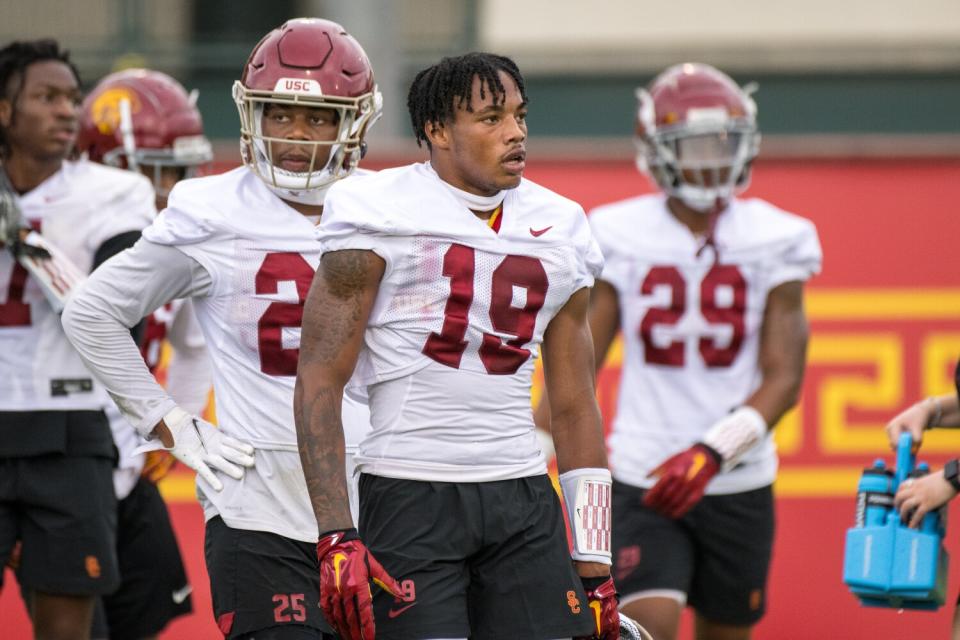Lincoln Riley hopeful USC and donor-run NIL collective it opposes can find common ground

- Oops!Something went wrong.Please try again later.
Two weeks before the question would cease to be hypothetical, Lincoln Riley was asked whether he believed USC and its name, image and likeness operation, BLVD LLC, could, if necessary , work in concert with a third-party collective whose deep-pocketed donors dictate their own approach to NIL.
“That’s the hope,” Riley told The Los Angeles Times last month at Pac-12 Conference media day before adding a note of caution.
Not all collectives, the Trojans coach warned, were operating with the same agenda as the universities they represent.
“There’s a million different problems that can be caused that way,” Riley said.
Many of those potential problems came into focus this week when a group of USC donors and fans announced the formation of Student Body Right, a third-party NIL collective that seeks to pay all Trojans football players who are academically eligible “the equivalent of a base salary” in exchange for a set amount of charitable work, according to Dale Rech, a lifelong USC fan and one of the collective’s founders.
Rech and his group didn’t exactly receive a warm welcome this week from USC, where administrators have been especially cautious in their approach to NIL — and clear in their opposition of outside, donor-run collectives, which they worry could invite NCAA scrutiny.
But while USC and Student Body Right might have started off on the wrong foot, the Trojans coach expressed hope Friday that all parties involved could find common ground.
“I think we’ve had a lot of signs internally that people want to support our program and are excited about what’s going on here,” Riley said. “That’s a notion we’re not surprised of. We very much believe in the BLVD concept, not only for what it can do for our student-athletes but also making sure we stay within the rules and have people that have been in this business and are experts in the field is very, very important to us.
“Listen, this is new for all of us. It’s still evolving in all kinds of places, all over the country, and I’m confident we’ll be able to bring everyone together and make sure it’s one united effort.”

That’s a slightly different tone than the one USC struck Tuesday, when the university’s official statement refused to acknowledge Student Body Right, noting it “is not aware of a formal donor-created NIL collective.”
That contentious relationship comes as no surprise to Mit Winter, a Kansas City, Mo.-based sports law attorney and NIL analyst.
“Universities, they would obviously prefer to have collectives run by people they have a good relationship with and that they can collaborate with and that they feel comfortable with, especially people they’re comfortable are going to adhere to NCAA rules,” Winter said. “But the interesting thing about the NIL world right now is that anybody can start a collective that’s built to support their favorite university, and there’s nothing the university can do about it.”
Details of how Student Body Right plans to support Trojans football players remain unclear, but Rech told The Times on Friday the collective expects to start issuing payments by the start of USC’s next spring semester, which begins Jan. 9.
How those payments are distributed will be of significant interest to USC. Student Body Right insists it has no interest in getting involved in recruiting or influencing prospective athletes in any way, which would represent an explicit violation of NCAA rules.
The group has filed for 501(c)(3) status as a charitable organization, offering at least a loose framework of how it must operate.
“The real test,” Winter said, “is going to be how they're operating after they already have that 501(c)(3) status — if they're operating in a way that really furthers their mission or are they just operating in a way to funnel as much booster fan money to the athletes as possible?”
Rech wouldn’t offer any specifics but he said his group considered the models of several college football collectives with 501(c)(3) status while determining how to best structure Student Body Right.
The group’s initial inspiration to pursue 501(c)(3) status came from Texas, where the Pancake Factory program within the Horns with Heart collective offers $50,000 annually to each Texas offensive lineman in exchange for activities that benefit charities.
The Matador Club, a collective at Texas Tech, expanded that notion to the entire team, paying each Red Raiders football player $25,000 per year in exchange for community service.
Friends of the University of Notre Dame, a collective led by former Fighting Irish quarterback Brady Quinn, acts a bit more hands-on, as the collective’s board interviews players to determine their best fit with a charity and then compensates the players for charity work, appearances and social media posts.
Student Body Right will presumably offer something along similar lines, with every player expected to receive a lump sum payment, or payments, in exchange for charitable work. But with USC officials on high alert, determined to avoid even a sniff of potential NCAA scrutiny, the devil will be in the details.
This story originally appeared in Los Angeles Times.

